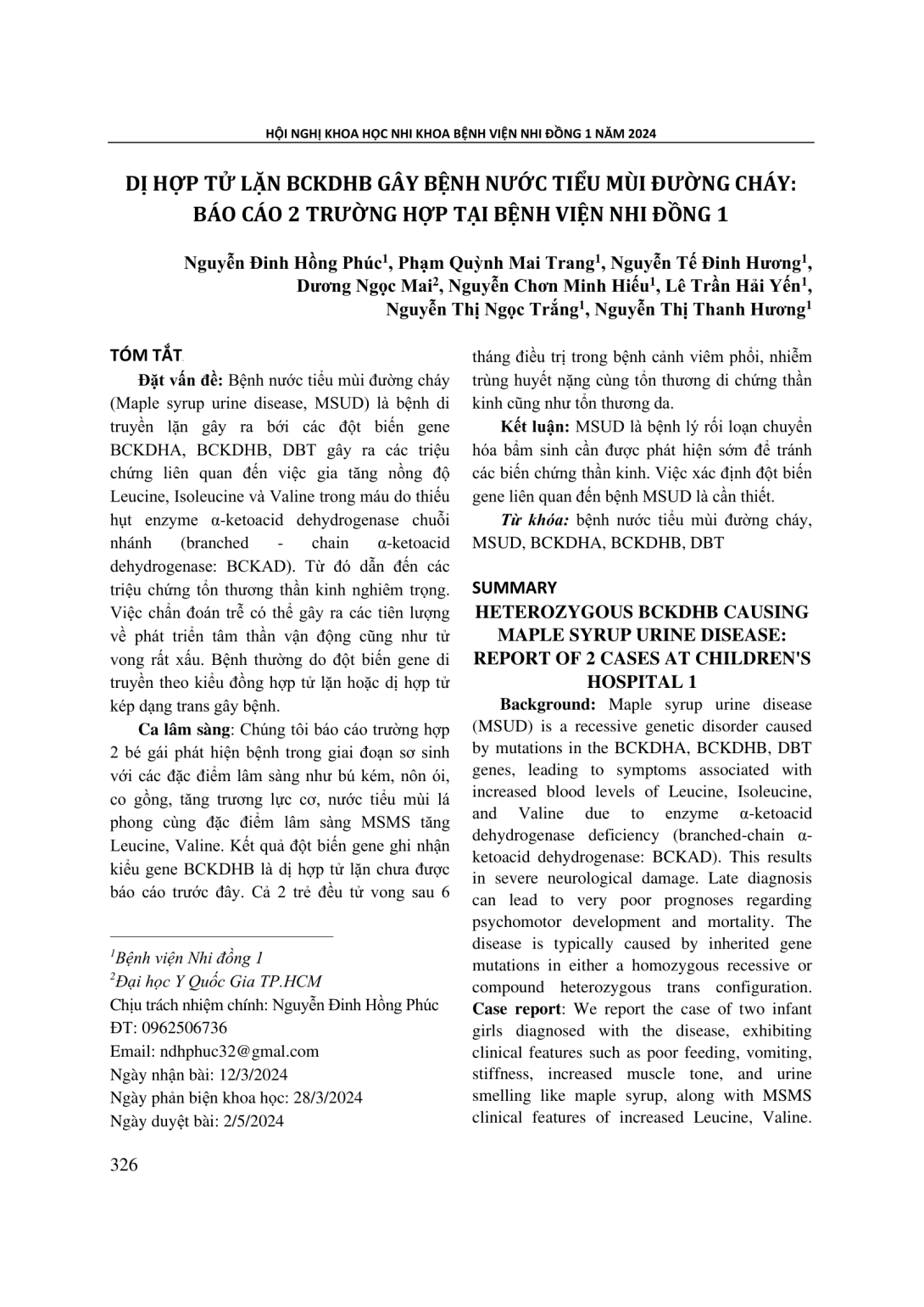
Bệnh nước tiểu mùi đường cháy (Maple syrup urine disease, MSUD) là bệnh di truyền lặn gây ra bới các đột biến gene BCKDHA, BCKDHB, DBT gây ra các triệu chứng liên quan đến việc gia tăng nồng độ Leucine, Isoleucine và Valine trong máu do thiếu hụt enzyme α-ketoacid dehydrogenase chuỗi nhánh (branched - chain α-ketoacid dehydrogenase: BCKAD). Từ đó dẫn đến các triệu chứng tổn thương thần kinh nghiêm trọng. Việc chẩn đoán trễ có thể gây ra các tiên lượng về phát triển tâm thần vận động cũng như tử vong rất xấu. Bệnh thường do đột biến gene di truyền theo kiểu đồng hợp tử lặn hoặc dị hợp tử kép dạng trans gây bệnh. Ca lâm sàng: Chúng tôi báo cáo trường hợp 2 bé gái phát hiện bệnh trong giai đoạn sơ sinh với các đặc điểm lâm sàng như bú kém, nôn ói, co gồng, tăng trương lực cơ, nước tiểu mùi lá phong cùng đặc điểm lâm sàng MSMS tăng Leucine, Valine. Kết quả đột biến gene ghi nhận kiểu gene BCKDHB là dị hợp tử lặn chưa được báo cáo trước đây. Cả 2 trẻ đều tử vong sau 6 tháng điều trị trong bệnh cảnh viêm phổi, nhiễm trùng huyết nặng cùng tổn thương di chứng thần kinh cũng như tổn thương da. Kết luận: MSUD là bệnh lý rối loạn chuyển hóa bẩm sinh cần được phát hiện sớm để tránh các biến chứng thần kinh. Việc xác định đột biến gene liên quan đến bệnh MSUD là cần thiết.
Maple syrup urine disease (MSUD) is a recessive genetic disorder caused by mutations in the BCKDHA, BCKDHB, DBT genes, leading to symptoms associated with increased blood levels of Leucine, Isoleucine, and Valine due to enzyme α-ketoacid dehydrogenase deficiency (branched-chain α-ketoacid dehydrogenase: BCKAD). This results in severe neurological damage. Late diagnosis can lead to very poor prognoses regarding psychomotor development and mortality. The disease is typically caused by inherited gene mutations in either a homozygous recessive or compound heterozygous trans configuration. Case report: We report the case of two infant girls diagnosed with the disease, exhibiting clinical features such as poor feeding, vomiting, stiffness, increased muscle tone, and urine smelling like maple syrup, along with MSMS clinical features of increased Leucine, Valine. The genetic mutation results recorded a previously unreported BCKDHB gene type as compound heterozygous recessive. Both children died after 6 months of treatment in the context of severe pneumonia, septicemia, neurological sequelae, and skin lesions. Conclusion: MSUD is an inherited metabolic disorder that needs to be detected early to avoid neurological complications. Identifying the genetic mutations related to MSUD is essential.
- Đăng nhập để gửi ý kiến
